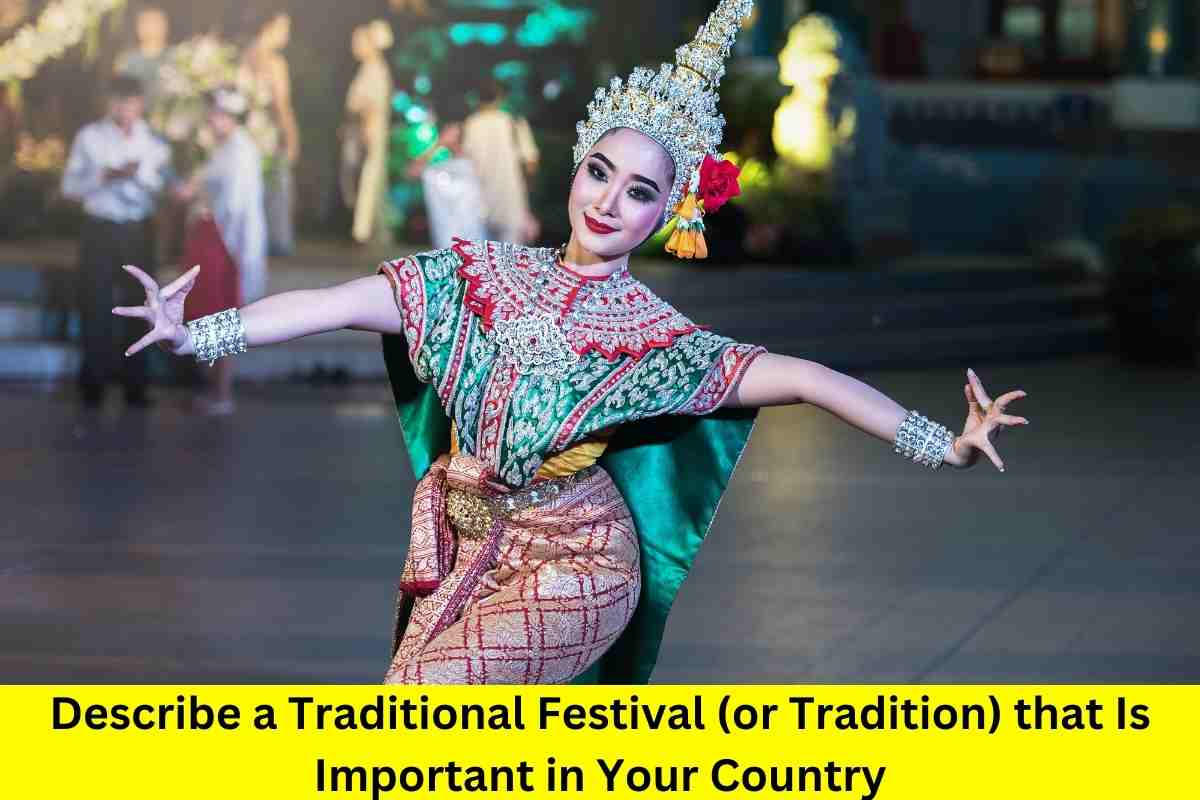Describe a traditional festival (or tradition) that is important in your country. You should say:-
- When does the festival occur?
- What do you do during it?
- What do you like or dislike about it?
- And explain why this festival is important.
Sample 1:- Describe a traditional festival (or tradition) that is important in your country.
Deeply rooted in the cultural ethos of my homeland, the “Diwali” festival in India, often referred to as the “Festival of Lights,” stands as a radiant testament to victory, hope, and renewal. Spanning five days and typically occurring in October or November, Diwali celebrates the triumph of light over darkness and good over evil.
Diwali is a kaleidoscope of rituals, lights, and communal gatherings. Homes and public spaces alike are adorned with oil lamps, or “diyas,” and colorful rangoli (artistic designs made on the ground using colored powders and flowers). Families come together to offer prayers, primarily to the goddess Lakshmi, the deity of wealth and prosperity. Fireworks illuminate the night sky, and the air is filled with the aroma of festive delicacies. Exchanging gifts and sweets among neighbors, friends, and family is a cherished tradition.
What resonates deeply with me is the universal theme of hope and new beginnings that Diwali embodies. The sheer joy of lighting up homes and hearts is unparalleled. However, despite environmental concerns, the increasing use of loud and polluting firecrackers is something I view with disfavor.
Peeling away its layers of festivity, Diwali offers profound spiritual insights. It’s a celebration of external lights and an invitation to ignite the inner light of awareness and goodness. The festival serves as a bridge between the past and the present, merging ancient rituals with contemporary expressions. Diwali’s myriad symbols and practices encapsulates India’s rich tapestry of traditions, underscoring the nation’s eternal quest for knowledge, enlightenment, and communal harmony.
Sample 2:- Describe a traditional festival (or tradition) that is important in your country.
Embedded within the cultural narrative of my nation, the “Thanksgiving Day” celebration in the United States stands as a heartfelt tribute to gratitude, family, and the bounties of nature. Observed on the fourth Thursday of November annually, Thanksgiving harks back to the early days of the pilgrims and their feast with the Native Americans, commemorating a successful harvest.
Thanksgiving is an intricate tapestry of culinary delights, family reunions, and reflective moments. Kitchens brim with activity as families prepare traditional dishes, notably the roasted turkey, cranberry sauce, stuffing, and pumpkin pie. Around the dinner table, family members and friends gather, sharing stories, laughter, and expressing gratitude for the year’s blessings. The day often begins with the famous Macy’s Thanksgiving Day Parade in New York, a spectacle of floats, performances, and massive balloons, watched by millions on television.
Personally, I am deeply fond of the sense of togetherness and reflection that Thanksgiving fosters. The focus on gratitude, especially in a world that often emphasizes material pursuits, is refreshing. However, the increasing commercialization, particularly the shopping frenzy of Black Friday that immediately follows, sometimes seems at odds with the spirit of the festival.
Beyond its feasts and festivities, Thanksgiving underscores the importance of pausing and acknowledging life’s big and small blessings. The festival acts as a gentle reminder of the ties that bind — familial, communal, and with nature. Thanksgiving epitomizes the core values of unity, reflection, and appreciation, which are ever-relevant in the ebb and flow of modern American life through its traditions, shared meals, and collective expressions of gratitude.
Sample 3:- Describe a traditional festival (or tradition) that is important in your country.
Steeped in the rich cultural heritage of my homeland, the “Eid al-Fitr” festival in many Muslim-majority countries stands as a triumphant culmination of the holy month of Ramadan. Falling on the first day of Shawwal, the tenth month of the Islamic lunar calendar, its date varies each year on the Gregorian calendar. Eid al-Fitr, often shortened to “Eid,” celebrates the conclusion of thirty days of dawn-to-sunset fasting.
Eid is a confluence of faith, festivity, and familial bonds. The day commences with a special prayer at mosques or open prayer grounds, often accompanied by giving “Zakat al-Fitr,” a form of charity to the less fortunate. Homes are filled with the aroma of traditional dishes, with biryanis, kebabs, and sweet dishes like ma’amoul and baklava taking center stage. Families and friends visit each other, exchanging greetings of “Eid Mubarak,” and children, dressed in their finest, eagerly await gifts or money.
Also, Read Describe an Occasion when You Waited a Long Time for A Nice Thing
I deeply cherish the spirit of communal harmony and generosity that Eid encapsulates. The emphasis on charity, ensuring everyone, regardless of their means, can partake in the celebrations, is particularly commendable. However, the increasing commercialization, with lavish parties and extravagant gifts, sometimes detracts from the festival’s spiritual essence.
Beyond its celebratory veneer, Eid al-Fitr is a testament to human discipline, resilience, and the spirit of community. It’s a day of gratitude, reflection, and a renewal of faith. Through its rituals, communal prayers, and shared joys, Eid serves as a poignant reminder of the core values of empathy, charity, and brotherhood in the tapestry of Islamic traditions.
Sample 4:- Describe a traditional festival (or tradition) that is important in your country.
Entwined with my nation’s historical and cultural tapestry, the “Carnival” in Brazil is an explosion of colors, rhythms, and revelry. Typically occurring in February or March, its timing is determined by the Catholic calendar, as it’s a prelude to Lent, the 40-day period before Easter.
Carnival is a mesmerizing fusion of parades, music, and dance. The streets of major cities, especially Rio de Janeiro, become a grand stage where samba schools showcase their meticulously choreographed dances and elaborate floats. Each samba school, representing different communities, competes passionately, telling stories through their themes, costumes, and sambas. Simultaneously, “blocos,” or street parties, pulse with life as people dance to infectious beats, adorned in vibrant costumes or sometimes just in glitter.
I’m particularly enamored with the inclusive spirit of Carnival. It’s a time when societal barriers dissolve, and everyone, regardless of their background, joins in the celebration. However, I do harbor reservations about the excessive commercialization in recent years, with VIP boxes and high-priced tickets sometimes overshadowing the communal essence of the festival.
Peeling back its festive layers, Carnival, at its core, is a reflection of Brazil’s diverse cultural heritage. It is an homage to African rhythms, Portuguese traditions, and indigenous tales. The festival is not just about unbridled joy; it’s a societal mirror, reflecting issues, dreams, and the collective spirit of Brazilians. Carnival underscores the resilience, creativity, and unity that form the heart of Brazil’s cultural identity through its pulsating beats, dazzling parades, and shared laughter.


Leave a Reply